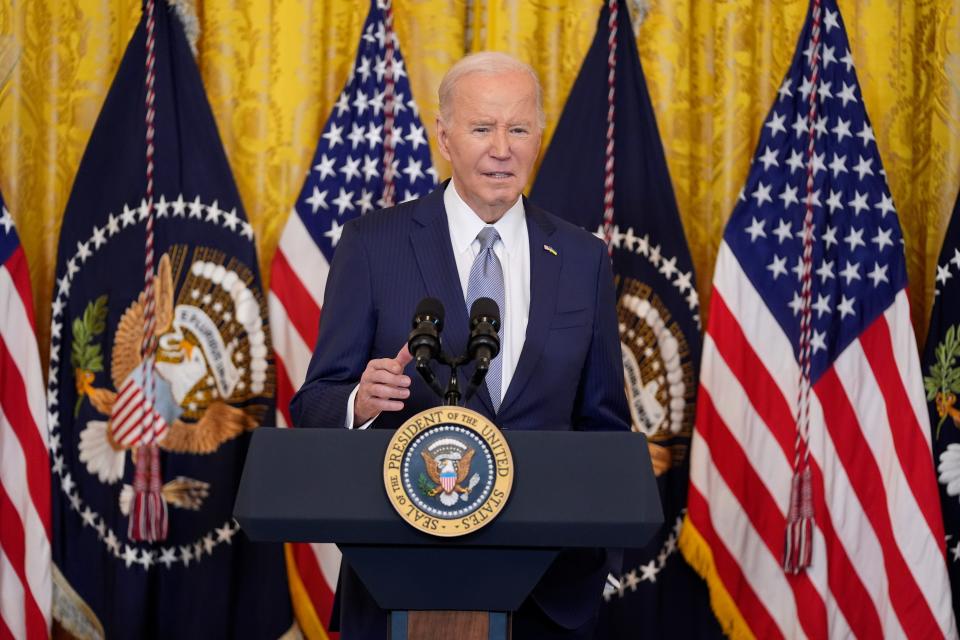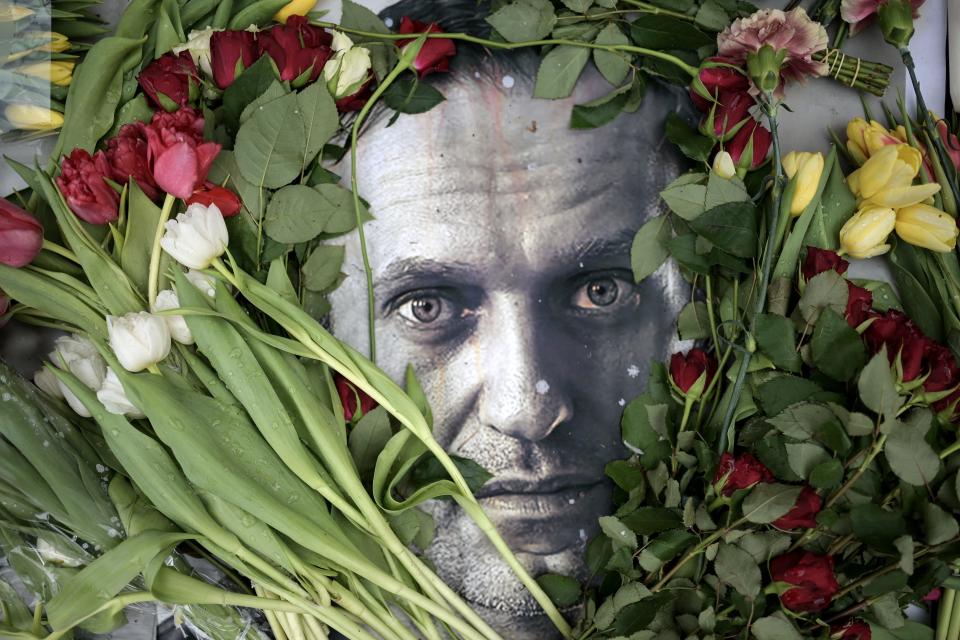Biden sanctions 500 Russian targets after death of Alexei Navalny, two years into war
- Oops!Something went wrong.Please try again later.
- Oops!Something went wrong.Please try again later.
- Oops!Something went wrong.Please try again later.
WASHINGTON – The Biden administration Friday unleashed sanctions on more than 500 Russian targets to mark the two-year anniversary of Russia's war in Ukraine and in response to the death of Russian dissident Alexei Navalny.
It is the largest round of financial penalties on Russia since Russian President Vladimir Putin invaded Ukraine in February 2022.
The sanctions, which are intended to disrupt Putin's war efforts, take aim at Russia’s financial sector, military-industrial complex, procurement networks and sanctions evaders across multiple continents. The U.S. also imposed sanctions on three Russian government officials connected to Navalny’s imprisonment.
"If Putin does not pay the price for his death and destruction, he will keep going. And the costs to the United States − along with our NATO Allies and partners in Europe and around the world − will rise," President Joe Biden said in a statement.
Biden promised a "major sanctions package" this week following the death of Navalny, a leading opposition leader of Putin who died last Friday under mysterious circumstances in a Russian prison. Previous U.S. sanctions placed on Russia, however, have failed to stop Putin from financing Russia's war in Ukraine.
The Treasury Department is sanctioning 300 Russian individuals and entities to deny Russia the resources necessary to carry out its war in Ukraine. Sanctions are aimed at Russia's core financial infrastructure including the state-owned operator of the the Mir National Payment System.

The U.S. imposed sanctions on nine Russian regional financial institutions, including several based in military hubs; five Russian investment and venture capital firms that underwrite Russia's development of new technology; and six financial tech companies that provide software for Russian financial institutions.
“Russia’s economy and military industrial base are showing clear signs of weakness in part due to the actions we, along with our partners and allies around the world, have taken to support Ukraine’s brave defense," Treasury Secretary Janet Yellen said. "Putin has mortgaged the present and future of the Russian people for his own aims to subjugate Ukraine."
Twenty-six entities and individuals across 11 other countries − such as China, Serbia and the United Arab Emirates − also face new U.S. sanctions for exporting technology, equipment and weapons that boost Russia's military-industrial base.
The Commerce Department has added 90 companies to its list of foreign parties that are subject to trade restrictions. Other sanctions imposed by the State Department are meant to restrict Russian energy revenue that has bolstered Putin's war machine.
All told, the U.S. has now imposed sanctions on 4,000 Russian entities since the start of its war in Ukraine. The latest sanctions are bolstered by similar moves by allies: The European Union announced its 13th round of sanctions on Russia, focused on limiting access to military technologies such as drones. Great Britain announced its own new sanctions on Russia.
Biden, in remarks from the White House, reflected on Russia's invasion of Ukraine two years ago as he announced the sanctions. Biden said Putin believed he would "roll into Ukraine" and "easily bend the will and break the resolve of the free people of Ukraine."
"Two years later, he remains wrong," Biden said. "He wasn't able to do that. Kyiv is still standing. Ukraine is still free. And the people of Ukraine remain unbowed and unbroken in the face of Putin's vigorous onslaught."
Biden has implored the Republican-controlled House of Representatives, which is on recess, to take up a security package with $60 billion in foreign aid to Ukraine. The legislation passed the Senate but House Speaker Mike Johnson has refused to take it to the House floor for a vote.

The White House has said House Republicans' inaction has already cost Ukraine on the battlefield, arguing Ukraine's lack of arms and ammunition led to its retreat last week from the town of Avdiivka, which was taken over by Russian forces.
"The clock is ticking," Biden said. "Brave Ukrainian soldiers and civilians are dying. Russia is taking Ukraine territory for the first time in many months. But here in America, the speaker gave the House a two-week vacation. They have to come back. They have to come back and get this done."
Biden has blamed Putin for the death of Navalny, 47, who for years was a leading critic of Putin, but the U.S. has not determined a cause of death. Navalny died in an Arctic Circle maximum-security prison where he had been held captive.
Biden, while in San Francisco, met Thursday with Yulia Navalnaya, Navalny's window, and his daughter Dasha Navalnaya to express his condolences.
"I assured them that his legacy will continue to live around the world," Biden said, "and we in the United States are going to continue to ensure that Putin pays a price for his aggression abroad and repression at home."
Reach Joey Garrison on X, formerly Twitter, @joeygarrison.
This article originally appeared on USA TODAY: New sanctions on Russia announced by US in response to Navalny's death

